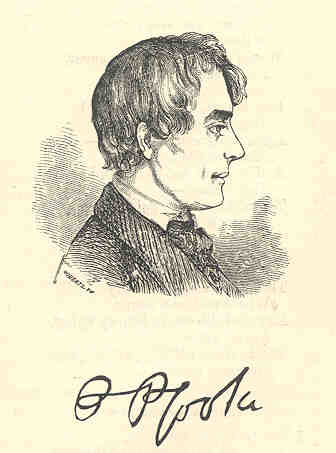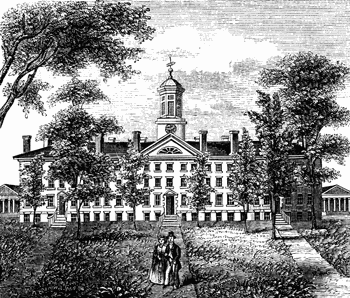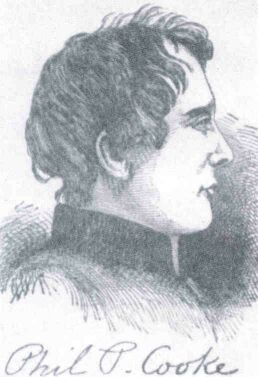Philip Pendleton Cooke

(1816-1850)
Virginia

Evert A. & George L. Duyckinck, The Cyclopaedia
of American Literature 571
(Philadelphia: William Rutter & Co., 1880)(Vol. 2)
The following biographical sketch of Philip Pendleton
Cooke appeared in the International Magazine of Literature, Art,
and Science (Vol. 4 (3), October, 1851):
Phillip Pendleton Cooke was born in Martinsburg, Berkeley county,
Virginia, on the twenty-sixth of October, 1816. His father, Mr.
John R. Cooke, was then and is now honorably distinguished at
the bar, and his mother was of that family of Pendletons which
has furnished so many eminent names to that part of the Union.
At fifteen he entered Princeton college, where he had a reputation
for parts, though he did not distinguish himself, or take an honor,
and could never tell how it happened that he obtained a degree,
as he was not examined with his class. He liked fishing and hunting
better than the books, and Chaucer and Spenser much more than
the dull volumes in the "course of study." He had already
made rhymes before he became a freshman, and the appearance of
the early numbers of the Knickerbocker Magazine prompted
him to new efforts in this way; he wrote for the Knickerbocker,
in his seventeenth year, The Song of the Sioux Lover, and
The Consumptive, and in a village paper, about the same
time, humorous and sentimental verses.

"Nassau Hall, Princeton College."
-------------------------
Benson J. Lossing, The Pictorial Field-Book of the Revolution (New York: Harper & Brothers, 1851)(The Princeton College image is not in the original International Magazine of Literature, Art, and Science article)
used with permission
of
Florida Center for Instructional Technology
When he left college his father was living at Winchester, and
there he himself pursued the study of the law. He wrote pieces
in verse and prose for the Virginian, and The Southern
Literary Messenger (then just started), and projected novels
and an extensive work in literary criticism. Before he was twenty-one
he was married, admitted to the bar, and had a fair prospect of
practice, in Frederick, Jefferson, and Berkeley counties. "I
am blessed by my fireside," he wrote, "here on the banks
of the Shenandoah in view and within a mile of the Blue Ridge;
I go to county towns, at the sessions of the courts, and hunt,
and fish, and make myself as happy with my companions as I can."
"So," he wrote to us in 1846, "have passed five,
six, seven, eight years, and now I am striving, after long disease
of my literary veins, to get the rubbish of idle habits away and
work them again. My fruit-trees, rosebushes, poultry, guns, fishing-tackle,
good, hard-riding friends, a long-necked bottle on my sideboard,
an occasional client, &c., &c., &c., make it a little
difficult to get from the real into the clouds again. It requires
a resolute habit of self-concentration to enable a man to shut
out these and all such real concerns, and give himself warmly
to the nobler or more tender sort of writing—and I am slowly
acquiring it."
The atmosphere in which he lived was not, it seems, altogether
congenial—so far as literature was concerned—and he wrote:
"What do you think of a good friend of mine, a most valuable
and worthy and hard-riding one, saying gravely to me a short time
ago, 'I would'nt waste time on a damned thing like poetry; you
might make yourself, with all your sense and judgment, a useful
man in settling neighborhood disputes and difficulties.' You have
as much chance with such people, as a dolphin would have if in
one of his darts he pitched in amongst the machinery of a mill.
"Philosophy would clip an angel's wings," Keats says,
and pompous dullness would so the same. But these very persons
I have been talking bout, are always read, when the world generally
has awarded the honors of successful authorship to any of our
mad tribe, to come in and confirm the award, and buy, if
not read, the popular book. And so they are not wholly without
their uses in this world. But woe to him who seeks to climb
amongst them. An author must avoid them until he is already mounted
on the platform, and can look down on them, and make them ashamed
to show their fulness by keeping their hands in their breeches
pockets, whilst the rest of the world are taking theirs out to
give money or to applaud with. I am wasting my letter with these
people, but for fear you may think I am chagrined or cut by what
I abuse them for, I must say that they suit one half of my character,
moods, and pursuits, in being good kindly men, rare table companions,
many of them great in field sports, and most of them rather deficient
in letters than mind; and that, in an everyday sense of the words,
I love and am beloved by them"
[The biographical sketch, with commentary on Cooke's
poetry which we do not reproduce here, also appeared in the Southern
Literary Messenger, Vol. 17 (10), Novebmer, 1851)]
Cooke's brother was the well-known novelist, John
Esten Cooke. John Rogers Cooke, Philip Pendleton's father and
a prominent lawyer, supervised his early education and it was with
his father that Cooke studied law after his education at Princeton.
"In 1837, he married Anne Corbin, daughter of Judge Nelson
Burwell. In 1845, he moved to 'The Vineyard,' an estate of one thousand
acres where he became known as the Nimrod of the Shenandoah."
[Ella May Turner, Stories and Verse of West Virginia
44 (Scottdale, Pennsylvania: Mennonite Publishing House, 1925, rev.
ed.)(1923)] [John Esten Cooke, Philip Pendleton Cooke's younger
brother, was also a lawyer and a poet.]
Philip P. Cooke
Rufus Wilmot Griswold, The Poets and Poetry of America 467-470
(Philadelphia: Carey and Hart, 1848)
Philip P. Cooke
National Cyclopaedia of American Biography 330
(New York: James T. White & Co., 1897)(vol. 7)

Cyclopedia of American Biographies
(1900)
Poem
Florence Vane
Florence
Vane
Poetry
Philip Pendleton Cooke, Froissart Ballads, and
Other Poems (Philadelphia: Carey and Hart, 1847) [online text] (New York:
Arno Press, 1972) [Edgar
Allen Poe's review]
Bibliography
John Daniel Allen, Philip Pendleton Cooke (Chapel
Hill: University of North Carolina, 1942)
May Alcott Thompson, Philip Pendleton Cooke (M.A.
Thesis, Columbia University, 1923)
Bibliography: Articles & Essays
John D. Allen, "Philip Pendleton Cooke,"
in Louis D. Rubin, Jr. (ed.), A Bibliographical Guide to the
Study of Southern Literature 181 (Baton Rouge, Louisiana State
University Press, 1969)
David Kelley Jackon, "Philip Pendleton Cooke,
Virginia Gentleman, Lawyer, Hunter, and Poet," in David Kelly
Jackson (ed.), American Studies in Honor of William Kenneth Boyd
282-326 (Durham, North Carolina: Duke University Press, 1940)
Karen L. Kilup, "Philip Pendleton Cooke," in Eric L. Haralson (ed.), Encyclopedia of American Poetry: The Nineteenth Century 93-99 (New York: Routledge, 1998)
Edward L. Tucker, Philip Pendleton Cooke: This Virginia
Man of Letters Preferred Poetry to the Law, 19 (3) Virginia Cavalcade
42 (Winter, 1970)
Autographed Photograph of Philip Pendleton Cooke &
Recollections of Philip Pendleton Cooke, 10 Proceedings: Clark County,
Virginia Historical Association (1950)
Research Resources
Pendleton
Records
Virginia Historical Society
Papers
Duke University Library
Durham, North Carolina
Web Research Resources
Touring
the Historical Area
including Cooke's burial site
Virginia
Literature
|


